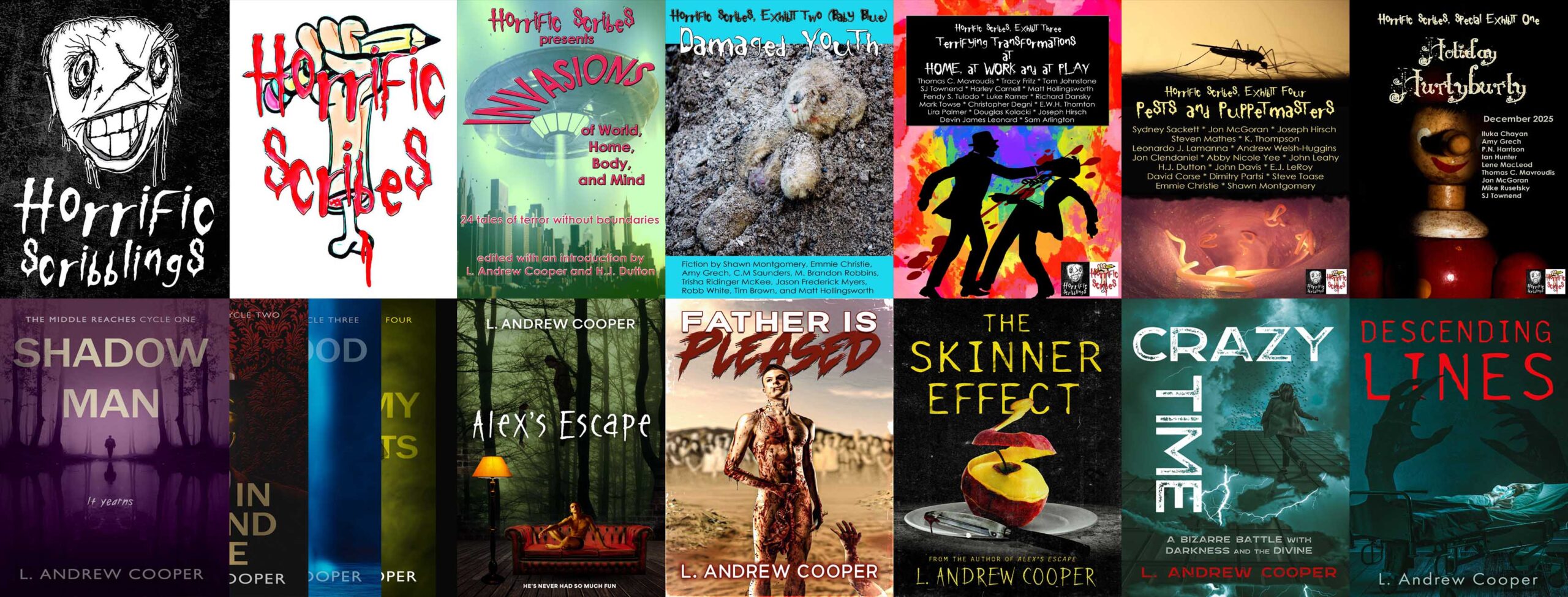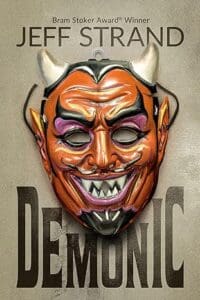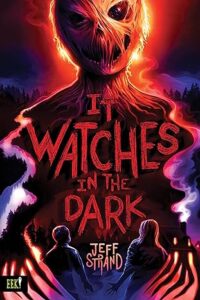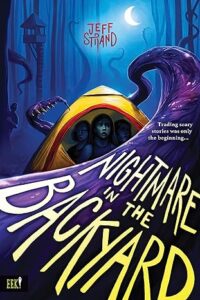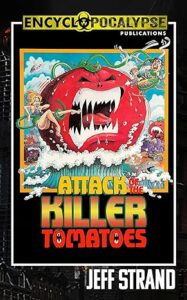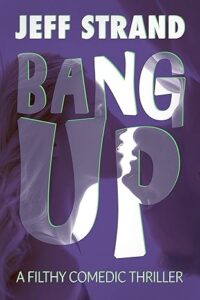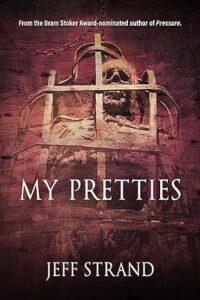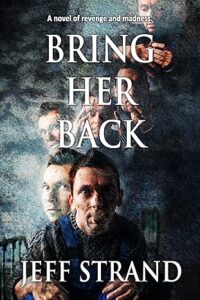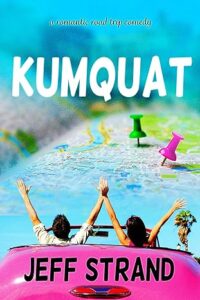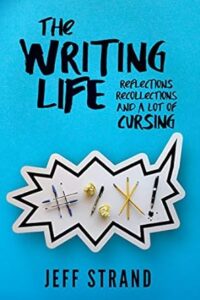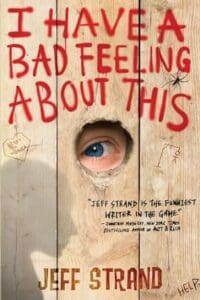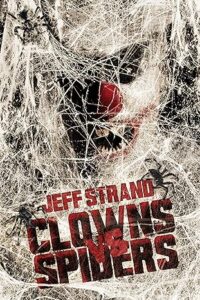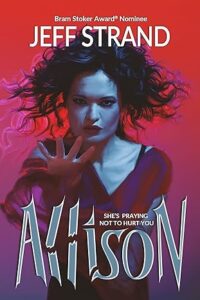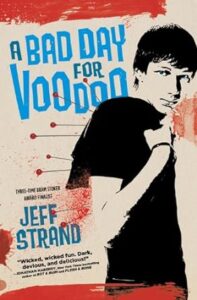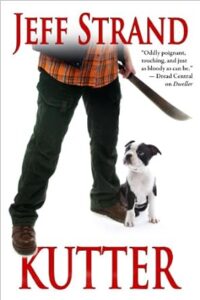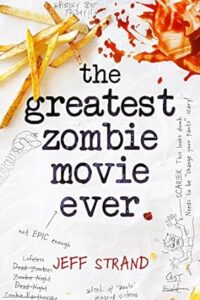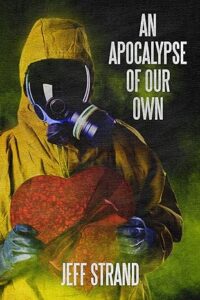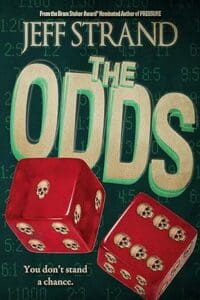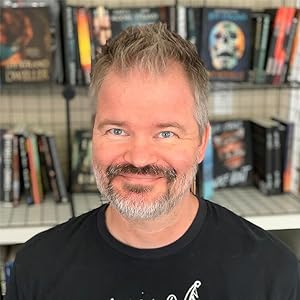Interview with Author Jeff Strand: Demonic, Veiled, It Watches in the Dark (Eek!), and Nightmare in the Backyard (Eek!) (2024)
Celebrated author Jeff Strand kindly agreed to answer some questions about his two most recent novels and two more coming soon!
Demonic
From the Bram Stoker Award-winning author of Pressure and Autumn Bleeds into Winter comes a new novel of unrelenting terror.
Corey is falling in love with his co-worker Quinn. This is a problem. Not only because Quinn is married, but because her husband is a serial killer known as the Toledo Trasher, who has been forcing her to participate in his savage crimes.
With nothing but Quinn’s best interests in mind, Corey shows up at their home with a gun in his pocket and a knife in his hand.
Unfortunately, there are some very dark forces at work, and Corey makes Quinn’s situation worse than he could have ever imagined. And now things are about to get really, really bloody…
With his trademark frenetic pacing and pitch-black humor, Demonic is Jeff Strand at his devilish best.
Veiled
The first time their eyes lock, it’s an amused and sympathetic look from Alice at the next table. She can tell Nate’s blind date is going horribly awry.
The second time is a chance meeting at a grocery store. Or is it by chance? It’s a little weird, but either way, Nate and Alice hit it off immediately.
He really likes her. They have great chemistry. But there’s something a little off—okay, a lot off—about her. Not just the unexplained sadness. It’s an intense desire, almost a desperation, for things to move much faster than Nate is comfortable with.
Alice has an obvious secret. What’s she hiding?
When Nate finds out…well, nobody said this was a romantic comedy…
From the Bram Stoker Award-winning author of My Pretties and Autumn Bleeds into Winter comes… Veiled.
It Watches in the Dark (Eek!)
“She glanced over her shoulder. Had the scarecrow moved? It stood there, smile stitched on its face, but now it felt like a smirk.”
Prepare to be scared silly in this creepy middle-grade novel! Twins seek medical help in a remote village after their father is in a canoeing accident… only to discover the scarecrow that stands watch in town may have a stronger hold over the residents than expected. Perfect for fans of R.L. Stine, Dan Poblocki, and Mary Downing Hahn.
Twins Oliver and Trisha love going on adventures with their dad. Canoeing and camping on the Champion River will be their best trip yet! But when they capsize in rapids, their father is knocked unconscious. Alone and without cell phone reception, their only choice is to continue down river for help.
Hours of paddling brings them to an old dock, and a narrow path leads them to a small village. The townspeople are kind and helpful but strangely focused on the giant scarecrow in the village square. “He watches over us,” the twins are told in whispers. “He keeps us safe.”
An old woman warns the twins not to spend the night in the village. Not if they ever want to leave. But with the sun soon to set and their father not well enough to be moved, how can they escape? More importantly, can they survive?
Nightmare in the Backyard (Eek!)
When the scratching starts on the tent, a backyard camping trip turns terrifying for three friends. Prepare to be scared silly in this creepy middle-grade novel for fans of R.L. Stine, Dan Poblocki, and Mary Downing Hahn.
Chloe, Avery, and Madison can’t wait to spend the night camping in the backyard. Smores! Spooky stories! Trading secrets! It’s going to be awesome. Sure, Elijah the kid next door keeps trying to prank them, but it’s all in good fun. Who doesn’t like a little scare after the sun has set and the moonlight casts creepy shadows everywhere?
Then the scratching starts on the tent fabric. The girls think it must be Elijah again, but there’s no one outside. As the scratching gets more insistent, the girls may need to start asking WHAT is making that noise rather than WHO. Can they make it through the night?
The Interview
1. Speed Demon. The description of Demonic refers to your “trademark frenetic pacing.” I’m still learning about your trademarks, but Demonic’s breakneck narrative speed is definitely a standout quality: it starts on a roll, gets faster, and never slows down. How do you plan a story so that the action and horror will proceed with nary a pause? How do you manage characterization while the characters can hardly catch their breaths? “Pitch-black humor” is another trademark, and aspects of Demonic are indeed quite funny. Where does the humor come from, and how do humor and pacing relate?
JS: The pacing doesn’t require that much planning ahead, beyond coming up with a concept that will sustain it. I worked out the big turning points of Demonic, and I knew I could tell the story without any padding. I try to maintain a fast pace even in something like Veiled, which is a psychological thriller without a lot of action.
Characterization is always my primary focus. The goal is to create compelling characters very quickly, but also never to lose sight of their personalities when the action kicks in. There’s an extended car chase in Demonic, but it’s Corey and Quinn in the vehicle, not some 1980’s video game characters, and how they’re reacting to the situation is what’s important. Corey has never experienced anything like this. He works a desk job. Corey and Quinn’s relationship is in a very weird place at the moment. That’s all key to the scene, though, obviously, I also want the reader to think “Woooo-eeeeee, that was a kick-ass car chase!”
For me, the humor is usually instinctual. I write humor pretty naturally, so if it’s a novel like Demonic, I’m not thinking, “Okay, I need a good joke here.” (Unlike, say, my novelization of Attack of the Killer Tomatoes, where the whole point was to be funny.) I allow myself quite a bit of creative license, but I do try to keep the humor believable within the context of the story.
2. Demon Theory. I don’t think I’m spoiling anything by saying that conflicts involving forces one might describe as “demonic” occur in Demonic, but they seem very different from Exorcist-style battles between the forces of Heaven and Hell. How would you describe the demonic in this novel’s universe? What, if any, religious context might it have? What makes this version of the demonic scary?
JS: Without giving too much away, they’re humans who have pledged their loyalty to somebody very bad, and this loyalty comes with certain benefits. There’s not much in the way of religious context—there aren’t any Bible passages quoted in the book. You’re not going to close the book and question your existing worldview. They’re scary because, as our heroes discover early on, they don’t exactly die the way a normal person would.
3. Demon Hunter? Corey, Demonic’s protagonist, fumbles his way into the main plot, and he does a few things that are remarkably heroic yet (forgive me) remarkably stupid. How would you describe Corey, and why did you design your protagonist this way? How sympathetic do you think readers generally feel toward him? Do you feel his character says something about “regular” guys? Why or why not?
JS: Flawed heroes are a recurring theme in my work, and it’s always a tricky balancing act. Unless it’s in something like Bang Up, purely for comedic effect, I don’t want to write about characters who are stupid. Corey isn’t an idiot. He’s just in waaaayyyyy over his head, and not every decision he makes is the best one. My goal is always to show things from the character’s perspective and have the reader think, “Okay, that worked out badly, but I might have done the same thing.”
You’re supposed to be rooting for the guy, and based on the reviews, I think readers do. I assume that most “regular” guys accept that if they were in this kind of mess, they might not handle it like Jack Reacher. I’m an intelligent guy who is extremely savvy about online scams, but not too long ago one of them got me and I clicked a link that subscribed me to several hundred mailing lists. Hopefully that didn’t make me too dumb to live!
4. Femmes Fatales. Quinn in Demonic and Alice in Veiled both know a lot more than they initially share with their male co-stars and, at least partly through their feminine allure, get the guys involved in overwhelmingly dangerous situations. They’re not noir stereotypes, but they do seem like femmes fatales. Do you see them that way? What might be the consequences of seeing either character through such a lens? Alice’s situation, not revealed until halfway through the book and developing until the end, makes her character particularly problematic, so I’ll repeat what I asked about Corey: how sympathetic do you think readers generally feel toward her?
JS: I don’t really see Quinn that way. She’s not manipulative and wasn’t trying to pull Corey into this situation. She had too much to drink and told him more than she should have, and he took the initiative to try to solve her problem without telling her. He got himself into this mess and made things much worse for her.
Obviously, Alice is difficult to discuss without spoilers, but the question is “How far would you go?” Because much of the plot of Veiled is a closely guarded secret and reviewers have (mostly) been considerate about not blabbing the details, I haven’t received much feedback on that aspect, but I have heard from readers who told me they can relate and would do the same thing. But if a reader hates her, that’s also a valid response, and I don’t think it takes away from the experience!
5. At Home with the Range. Your bio says your novels are “all over the place,” and I get a taste of that moving from Demonic, which focuses on fast action and explicit horror, to Veiled, which focuses on suspense, subtler, grounded horror, and so much mystery that asking questions about it without revealing too much is challenging. How and when do you determine which genre conventions, moods, and styles will govern a project? Do you deliberately change focuses as you move from one project to the next?
JS: Very deliberately. I don’t want to write the same book over and over. When I go really, really dark, as with My Pretties or Bring Her Back, I try to follow it up with something more fun. If my last book was supernatural horror, I might try a thriller. Every once in a while, I’ll do a complete outlier like Kumquat, a romantic comedy. Within the very important context that writing is my only source of income and I have to write stuff that my readers want to buy, I try to mix things up.
6. Veiled Inspiration? A couple of familiar nightmares seem to lie in Veiled’s foundation. The first, mentioned in the description, is the girlfriend who wants too much commitment too soon. The second—hopefully not too much of a spoiler—is saying something insensitive in the wrong company and having it come back to haunt you. Did first- or second-hand experiences with such nightmares inspire you? Where did (what you can share about) Veiled originate?
JS: Veiled originated with that great big reveal at the halfway point. It wasn’t going to be a secret; it was simply going to be the plot of the book. But when I began to construct the story, I realized that it would be more effective if the reader didn’t know what was happening, and so I reworked it as a mystery.
I haven’t had any experience with girlfriends who want too much commitment too soon, but I also haven’t had any experience with werewolves, so I was able to fake it. As for saying the wrong thing… I’m still haunted by stuff I said thirty years ago to people who probably forgot it thirty seconds later. In my non-fiction book The Writing Life: Reflections, Recollections, and a Lot of Cursing, I wrote about an event where a woman came up to my table to rave about how much she loved Cyclops Road. We talked for a couple of minutes, and then a friend I’d never met in real life came up behind me to introduce herself. My attention was pulled away with a quick “Hey, great to finally meet you!” and when I turned back, the woman was gone, never to be seen again. She probably thought I was a complete douchebag. It makes me sick to think about that moment, but what if she obsessed over it even more…?
7. Childhood Inspiration. More than once, Corey in Demonic retreats into happy childhood memories of the Scholastic Book Fair to escape the horrors around him. I get the feeling you might have similar memories (I certainly do). Now you write middle-grade novels that might be the stuff of such memories for a new generation. Does enabling those kinds of experiences motivate your middle-grade writing? What inspired you to target younger readers with It Watches in the Dark and Nightmare in the Backyard, both of which are forthcoming later in 2024?
JS: Though I do think “Okay, how would I have reacted to this situation at this age?” there’s almost none of my personal experience in either of these books. I just try to create characters and have them behave in a believable manner. I keep the slang and pop culture references to a bare minimum because that kind of stuff can become hilariously out of date very quickly. The inspiration for writing these came from my editor at Sourcebooks saying, “Hey, you wrote a few YA comedies for us, would you now like to write some middle-grade horror novels?”
The inspiration for the specific books was from my frequent process of asking, “What horror trope haven’t I tackled yet, and how can I twist it around?” In this case it was folk horror and Lovecraftian horror.
8. Eek! Maybe I’m just sensitive to the idea of being trapped overnight in a small village that seems to be controlled by an evil scarecrow, but It Watches in the Dark sounds freaky to me, and I’m a hardcore horrorhound. Is it as scary as it sounds? How do you measure out the fright factor to make the level appropriate for middle grade? How do you feel about giving kids nightmares?
JS: It’s even scarier than it sounds. You definitely can’t handle it. But seriously, it’s really just about walking the line between “fun creepy” and “disturbing creepy.” I want it to live up to the promise of a book that has a great big scarecrow on the cover, but my goal is not for the kids to close the book and stare off blankly, their fragile minds coping with the nihilism of existence. It’s the scariness of a campfire story or a rollercoaster. (Admittedly, my editor did ask me to tone down some bits that went a little too far.) If a kid has to sleep with the lights on for a couple of nights, that’s part of the fun of being a horror fan. There’s no bait and switch–the hope is that a kid who picks up a book with that cover is looking for that kind of reading experience!
9. Backyard Universe. I remember the backyard being a place to build worlds in my imagination, but home was always nearby for a quick escape. In Nightmare in the Backyard, how do you transform the girls’ backyard camping excursion into a universe remote enough for help to seem out of range and the dangers to seem life-threatening?
JS: A big part of their problem in the book is that their cell phones don’t work, and nobody in the neighboring yards can seem to see or hear what is happening. Chloe’s mother is right there inside the house, but she has no idea what’s going on! They aren’t in a cabin deep in the woods, but they might as well be.
10. Maddening. Your bio says several of your books are in development as motion pictures, and you’re MOSTLY not allowed to blab any details. I’m seizing on that “mostly” and asking—what details CAN you share? Which books? Can you say anything about timelines? Are you involved with the screenwriting? Your writing is very visual and could translate well to the screen. Exciting stuff!
JS: There’s a lot of stuff going on, but I’ve found the idea of “Don’t ask how a bad movie got made; ask how anything gets made at all!” to be entirely true. It’s unreal. I’ll just go ahead and bombard you with a list of titles that are in some stage of development: I Have a Bad Feeling About This, Wolf Hunt, Clowns Vs. Spiders, Allison, A Bad Day For Voodoo, Kutter, The Greatest Zombie Movie Ever, Kumquat, An Apocalypse of Our Own, and The Odds. For some of these I wrote the screenplay; for most I didn’t. Some have been in the works for several years. One is a big-studio production that earned me my WGA card for writing the script. None of them have yet involved somebody turning on a camera to record a moving image.
About the Author
Jeff Strand’s bio was funnier when he talked about losing the Bram Stoker Award four times, but he’s now a Bram Stoker Award WINNER!
His novels are usually classified as horror, but they’re really all over the place, almost always with a great big dose of humor. He’s written five young adult novels that all fall into the “really goofy comedy” category.
Several of his books are in development as motion pictures, and he’s mostly not allowed to blab any details, which he finds MADDENING.
He currently lives in sunny, warm Duluth, Minnesota.
